
Active Group and Experts Club have conducted a joint study on the attitudes of Ukrainians towards the countries of East Asia and the Middle East. The study was presented at the Interfax-Ukraine news agency in June 2024. The research was presented by Maksym Urakin and Oleksandr Poznyi. The results of the study are as follows:
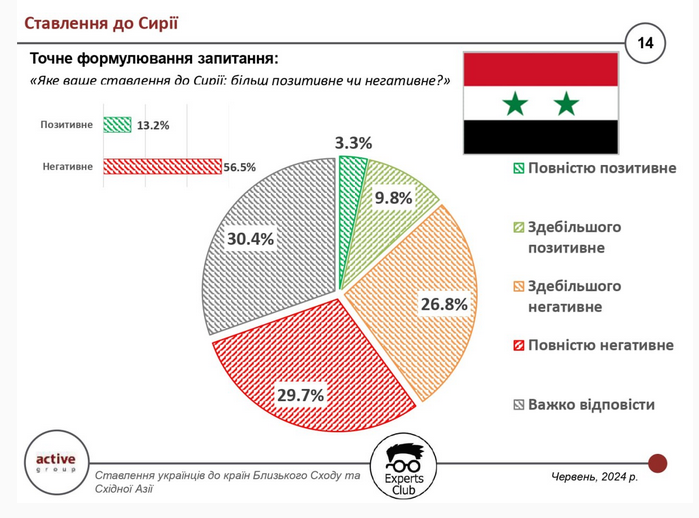
The results of the survey are as follows:
Completely positive – 3.3%.
Mostly positive – 9.8
Mostly negative – 26.8
Completely negative – 29.7 %.
Difficult to answer – 30.4%.
Positive – Negative – 43.3
On March 31, 1992, diplomatic relations between Ukraine and the Syrian Arab Republic were established.
The joint research by Active Group and Experts Club on the attitudes of Ukrainians towards the countries of East Asia and the Middle East was conducted in April-May 2024. It covers such countries as Turkey, Iran, Israel, Egypt, Jordan, Saudi Arabia, UAE, Afghanistan, Pakistan, Azerbaijan, Uzbekistan, Turkmenistan, Kyrgyzstan, Tajikistan, Kazakhstan, Georgia, Armenia, India, China, Republic of Korea, DPRK, Japan, Vietnam, Indonesia, Syria, and Iraq. Full information on the research is available on the website of the Club of Experts at
https://expertsclub.eu/cpilne-doslidzhennya-kompaniyi-active-group-ta-experts-club-shhodo-stavlennya-ukrayincziv-do-krayin-shidnoyi-aziyi-ta-blyzkogo-shodu/
Video – https://interfax.com.ua/news/video/993142.html

Active Group and Experts Club conducted a joint study on the attitudes of Ukrainians towards the countries of East Asia and the Middle East. The research was presented at the Interfax-Ukraine news agency in June 2024. The research was presented by Maksym Urakin and Oleksandr Poznyi. The results of the study are as follows:
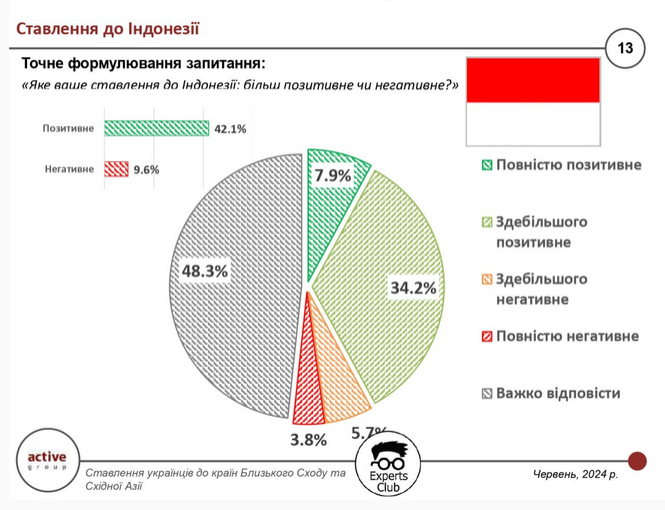
The results of the survey are as follows:
Completely positive – 7.9%.
Mostly positive – 34.2
Mostly negative – 5.7
Completely negative – 3.8
Difficult to answer – 48.3%.
Positive – Negative – 32.5
On June 11, 1992, diplomatic relations between Ukraine and Indonesia were established.
The joint research by Active Group and Experts Club on the attitudes of Ukrainians towards the countries of East Asia and the Middle East was conducted in April-May 2024. It covers such countries as Turkey, Iran, Israel, Egypt, Jordan, Saudi Arabia, UAE, Afghanistan, Pakistan, Azerbaijan, Uzbekistan, Turkmenistan, Kyrgyzstan, Tajikistan, Kazakhstan, Georgia, Armenia, India, China, Republic of Korea, DPRK, Japan, Vietnam, Indonesia, Syria, and Iraq. Full information on the research is available on the website of the Club of Experts at
https://expertsclub.eu/cpilne-doslidzhennya-kompaniyi-active-group-ta-experts-club-shhodo-stavlennya-ukrayincziv-do-krayin-shidnoyi-aziyi-ta-blyzkogo-shodu/
Video – https://interfax.com.ua/news/video/993142.html

Active Group and Experts Club conducted a joint study on the attitudes of Ukrainians towards the countries of East Asia and the Middle East. The research was presented at the Interfax-Ukraine news agency in June 2024. The research was presented by Maksym Urakin and Oleksandr Poznyi. The results of the study are as follows:
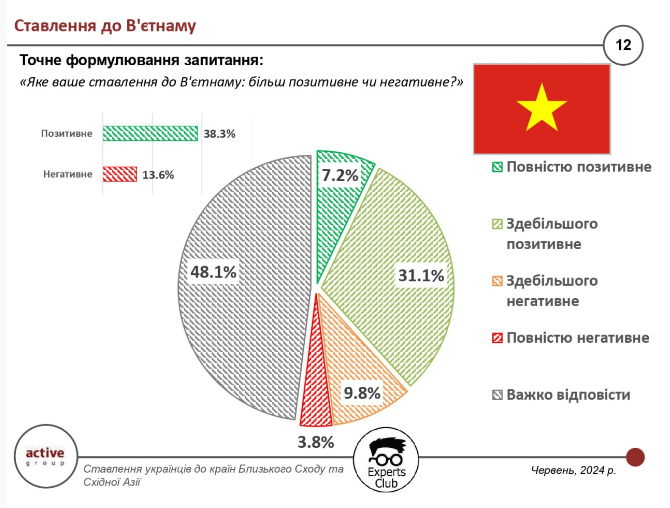
The results of the survey are as follows:
Completely positive – 7.2
Mostly positive – 31.1 %.
Mostly negative – 9.8
Completely negative – 3.8 %.
Difficult to answer – 48.1%.
Positive – Negative – 24.6
On January 23, 1992, Ukraine and Vietnam established diplomatic relations.
The joint research by Active Group and Experts Club on the attitudes of Ukrainians towards the countries of East Asia and the Middle East was conducted in April-May 2024. It covers such countries as Turkey, Iran, Israel, Egypt, Jordan, Saudi Arabia, UAE, Afghanistan, Pakistan, Azerbaijan, Uzbekistan, Turkmenistan, Kyrgyzstan, Tajikistan, Kazakhstan, Georgia, Armenia, India, China, Republic of Korea, DPRK, Japan, Vietnam, Indonesia, Syria, and Iraq. Full information on the research is available on the website of the Club of Experts at
https://expertsclub.eu/cpilne-doslidzhennya-kompaniyi-active-group-ta-experts-club-shhodo-stavlennya-ukrayincziv-do-krayin-shidnoyi-aziyi-ta-blyzkogo-shodu/
Video – https://interfax.com.ua/news/video/993142.html

Active Group and Experts Club have conducted a joint study on the attitudes of Ukrainians towards the countries of East Asia and the Middle East. The research was presented at the Interfax-Ukraine news agency in June 2024. The research was presented by Maksym Urakin and Oleksandr Poznyi. The results of the study are as follows:
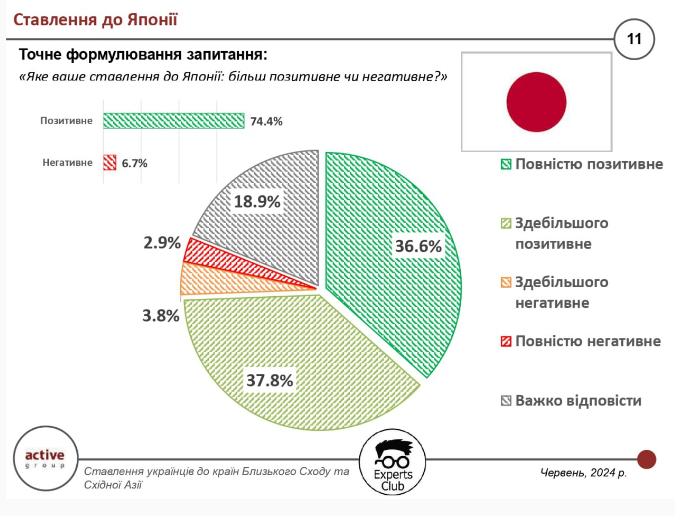
The results of the survey are as follows:
Completely positive – 36.6
Mostly positive – 37.8
Mostly negative – 3.8
Completely negative – 2.9 %.
Difficult to answer – 18.9%.
Positive – Negative – 67.7
Japan recognized Ukraine’s independence on December 28, 1991, and established diplomatic relations with Ukraine on January 26, 1992. On January 20, 1993, the Japanese Embassy was opened in Ukraine.
The joint research by Active Group and Experts Club on the attitudes of Ukrainians towards the countries of East Asia and the Middle East was conducted in April-May 2024. It covers such countries as Turkey, Iran, Israel, Egypt, Jordan, Saudi Arabia, UAE, Afghanistan, Pakistan, Azerbaijan, Uzbekistan, Turkmenistan, Kyrgyzstan, Tajikistan, Kazakhstan, Georgia, Armenia, India, China, Republic of Korea, DPRK, Japan, Vietnam, Indonesia, Syria, and Iraq. Full information on the research is available on the website of the Club of Experts at
https://expertsclub.eu/cpilne-doslidzhennya-kompaniyi-active-group-ta-experts-club-shhodo-stavlennya-ukrayincziv-do-krayin-shidnoyi-aziyi-ta-blyzkogo-shodu/

Active Group and Experts Club have conducted a joint study on the attitudes of Ukrainians towards the countries of East Asia and the Middle East. The study was presented at the Interfax-Ukraine news agency in June 2024. The research was presented by Maksym Urakin and Oleksandr Poznyi. The results of the study are as follows:
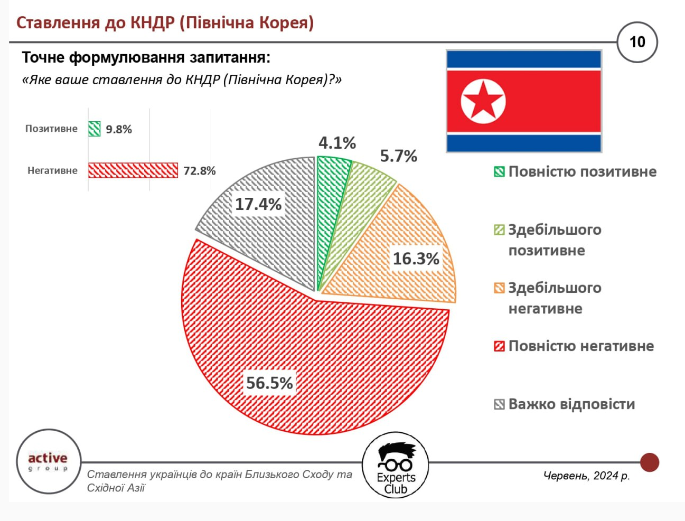
The results of the survey are as follows:
Completely positive – 4.1%.
Mostly positive – 5.7
Mostly negative – 16.3
Completely negative – 56.5
Difficult to answer – 17.5%.
Positive – Negative – 62.9 %.
The joint research by Active Group and Experts Club on the attitudes of Ukrainians towards the countries of East Asia and the Middle East was conducted in April-May 2024. It covers such countries as Turkey, Iran, Israel, Egypt, Jordan, Saudi Arabia, UAE, Afghanistan, Pakistan, Azerbaijan, Uzbekistan, Turkmenistan, Kyrgyzstan, Tajikistan, Kazakhstan, Georgia, Armenia, India, China, Republic of Korea, DPRK, Japan, Vietnam, Indonesia, Syria, and Iraq. Full information on the research is available on the website of the Club of Experts at
https://expertsclub.eu/cpilne-doslidzhennya-kompaniyi-active-group-ta-experts-club-shhodo-stavlennya-ukrayincziv-do-krayin-shidnoyi-aziyi-ta-blyzkogo-shodu/

Active Group and Experts Club have conducted a joint study on the attitude of Ukrainians towards the countries of East Asia and the Middle East. The study was presented at the Interfax-Ukraine news agency in June 2024. The research was presented by Maksym Urakin and Oleksandr Poznyi. The results of the study are as follows:
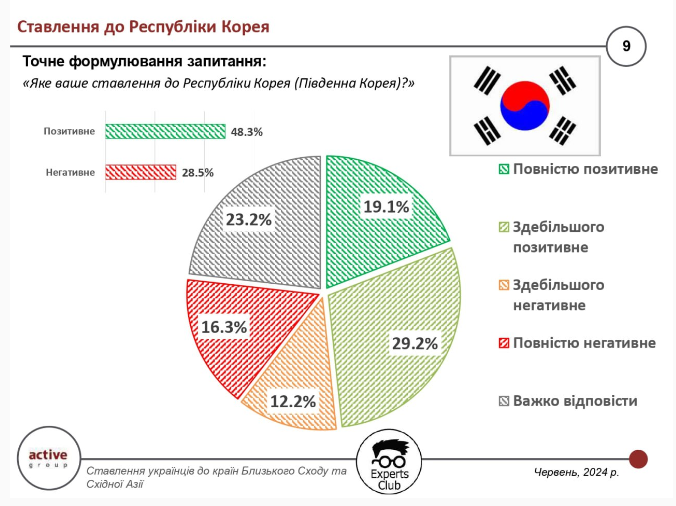
The results of the survey are as follows:
Completely positive – 19.1%.
Mostly positive – 29.2
Mostly negative – 12.2
Completely negative – 16.3 %.
Difficult to answer – 23.2%.
Positive – Negative – 19.9
On February 10, 1992, Ukraine and South Korea established diplomatic relations.
The joint research by Active Group and Experts Club on the attitudes of Ukrainians towards the countries of East Asia and the Middle East was conducted in April-May 2024. It covers such countries as Turkey, Iran, Israel, Egypt, Jordan, Saudi Arabia, UAE, Afghanistan, Pakistan, Azerbaijan, Uzbekistan, Turkmenistan, Kyrgyzstan, Tajikistan, Kazakhstan, Georgia, Armenia, India, China, Republic of Korea, DPRK, Japan, Vietnam, Indonesia, Syria, and Iraq. Full information on the research is available on the website of the Club of Experts at
https://expertsclub.eu/cpilne-doslidzhennya-kompaniyi-active-group-ta-experts-club-shhodo-stavlennya-ukrayincziv-do-krayin-shidnoyi-aziyi-ta-blyzkogo-shodu/
ACTIVE GROUP, EXPERTS CLUB, Poznyi, Republic of Korea, URAKIN